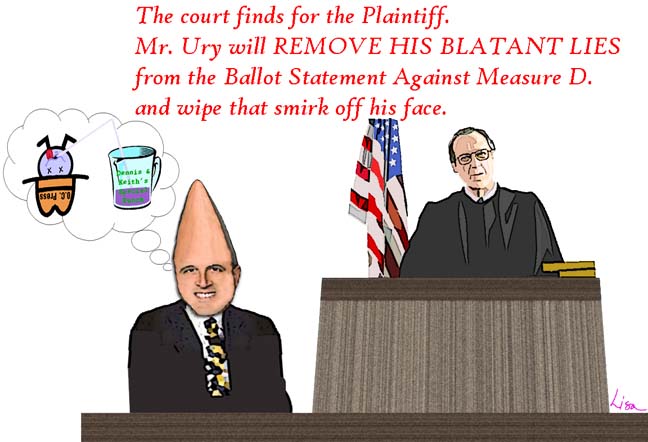|
|
|
Ballot Box Zoning and Other Bogeymen You can always tell when an idea comes along that threatens a bureaucracy because those bureaucrats and politicians start decrying how bad the idea is. The more power they stand to lose, the more they will lie. The “Mission Viejo Right to Vote” initiative, on the June 8 ballot as Measure D, is one such idea. It provides a way for every voter to have the final say on major changes in our city's land-use policies. Members of the opposition, led by Frank Ury, a city councilman, are doing their very best to mislead voters by using a series of falsehoods to describe Measure D. They use terms like “ballot box zoning” and “job killer” to describe Measure D. Measure D is not ballot box zoning. Let's look at what “ballot box zoning” actually is. This term is correctly applied when the voters directly determine what zoning will apply to a specific property or class of properties without any recourse to the usual planning process. For example, if voters passed a law that said “The land at Main and Fifth Street shall be used to build a Costco,” that would be “ballot box zoning,” as there is no way for the city's planning department to enforce compliance with city standards because the right to build had already been conferred. In addition, if the Costco was not built, the land would be vacant. Measure D takes the opposite approach. When a property owner wants to change the zoning of a parcel, they would first go to the Mission Viejo Planning Department and determine the city's limitations on that type of zoning, such as street setback, height limits or parking ratios. If the city's rules will meet the property owner's needs for the new use, the matter would be brought before the Planning Commission. A series of meetings would be held, including at least one Public Hearing, where members of the public could express their concerns and ask questions about the project. A series of Conditions would be placed on the development so that the new project would meet all of the City's standards. If the Planning Commission voted to approve the zoning change with all of the Conditions, then the matter would be considered by the City Council. Only if the Planning Department, Planning Commission and City Council all approved the zoning change, then the voters of Mission Viejo would vote on the zoning change at the next election, with all costs of the election paid by the property owner. Measure D gives the voters the final say on zoning changes for projects that meet all of Mission Viejo's high standards for development. This means that we are deciding on changing zoning only, and we don't have to be experts on the details of how well the project will be built. We get to say if the property that was a golf course should be converted to high-density housing. We don't have to worry that the housing would be poorly constructed, if approved, because the project already passed through all of the usual steps that ensure anything built in Mission Viejo will meet or exceed our standards. Another phrase that is used to obscure the reality of Measure D is the term “job killer.” In this case, nothing could be further from the truth. During the past 15 years, every major zoning change was in the direction of rezoning commercial property to high-density residential. As everyone knows, commercial property is used for businesses, which provide jobs and, in some cases, sales taxes to the city. When these properties were converted from commercial to residential, those conversions were “job killers.” Ury and his cronies, Kelley and MacLean, voted for two of these conversions, and so they are responsible for directly killing jobs. Measure D would likely have stopped or significantly modified the job-killing conversions of commercial properties to residential approved by the last few city councils. In every case, the neighbors opposed the conversion on grounds of traffic, effects on schools and crime resulting from high-density development. So, Measure D will likely save jobs in Mission Viejo, based on the past 15 years of development in our city. The opponents of Measure D also say that “businesses won't be able to expand” if Measure D is passed. In fact, there is no barrier to expansion of businesses in Mission Viejo as long as they don't need to tear down houses to build office buildings or other commercial space. When Mission Viejo was Master Planned, the planners in the Mission Viejo Company provided plenty of space for commercial uses. This has been sufficient to date, as there have been no conversions of residential property to commercial uses that I am aware of. This proves that there is no truth to labeling Measure D as a “job killer.” In summary, Measure D is not “ballot box zoning” and is, in fact, a “job saver” for Mission Viejo. Please vote “Yes” on Measure D on June 8, 2010.. |
|||
 |
|||